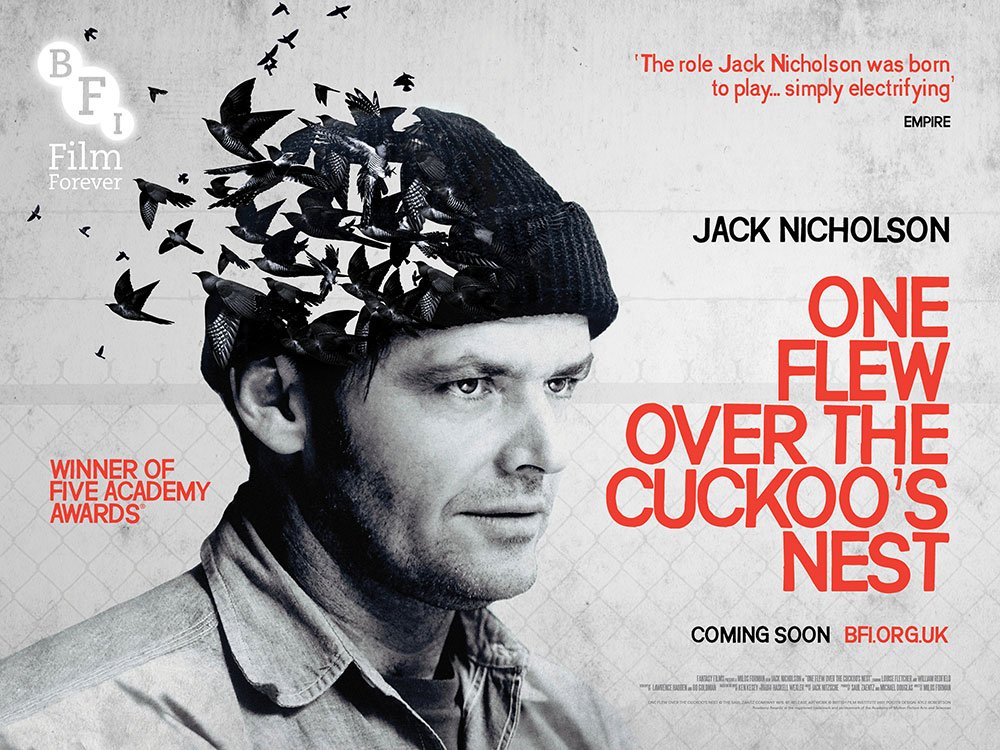One Flew Over the Cuckoo’s Nest (1957)

Released in 1975 and directed by Milos Forman, “One Flew Over the Cuckoo’s Nest” is a landmark film that boldly explores themes of freedom, mental illness, and the struggle against oppressive authority. Adapted from Ken Kesey’s 1962 novel, the film features a powerhouse performance from Jack Nicholson as Randle P. McMurphy, a rebellious man who feigns insanity to escape a prison sentence. With its compelling narrative and profound social commentary, “One Flew Over the Cuckoo’s Nest” has rightfully earned its place as a classic in American cinema.
Set in a mental institution in the 1960s, the story centers around McMurphy, who soon realizes that the confines of the asylum are just as stifling as those of the prison he sought to escape. The film opens with McMurphy’s arrival at the institution, where he quickly clashes with the cold, authoritarian Nurse Ratched, played brilliantly by Louise Fletcher. Ratched epitomizes the oppressive nature of institutional authority, enforcing strict rules and maintaining control over her patients with a combination of fear and manipulation. The power struggle between McMurphy and Ratched becomes the central conflict of the film, symbolizing the broader battle between individuality and conformity.
Jack Nicholson’s portrayal of McMurphy is nothing short of iconic. He embodies the character’s charm, wit, and rebellious spirit, bringing a sense of vitality and energy to the film. McMurphy’s determination to resist the dehumanizing practices of the institution resonates deeply, as he seeks to inspire his fellow patients to reclaim their identities and assert their autonomy. Nicholson’s performance is both captivating and layered, showcasing the character’s vulnerability alongside his defiance. His interactions with the other patients—such as Chief Bromden (Will Sampson), a giant of a man who pretends to be deaf and mute—highlight the themes of friendship and solidarity in the face of oppression.
The supporting cast adds tremendous depth to the narrative. Louise Fletcher’s chilling performance as Nurse Ratched is a masterclass in subtlety, embodying the cold, clinical nature of authority that crushes the spirits of those under her care. The other patients, including characters played by Danny DeVito and Christopher Lloyd, represent a range of responses to institutionalization, from passive compliance to outright rebellion. Their relationships with McMurphy illustrate the impact of his presence in the ward, as he gradually encourages them to find their voices and challenge the status quo.

One of the film’s most powerful themes is the concept of freedom and what it means to be truly alive. McMurphy’s arrival disrupts the monotony of institutional life, breathing life into the patients who have become resigned to their fate. The film poignantly explores the struggle for individual identity in a system that seeks to categorize and control. McMurphy’s attempts to assert his independence—whether through organizing activities, challenging Ratched’s authority, or simply engaging the other patients in laughter—serve as a powerful reminder of the importance of self-expression and personal freedom.

Milos Forman’s direction is both sensitive and incisive, effectively capturing the emotional weight of the story while maintaining a tense atmosphere. The cinematography by Haskell Wexler enhances the film’s realism, contrasting the bleakness of the institution with the vibrant moments of rebellion and camaraderie. The use of close-ups allows viewers to connect intimately with the characters, drawing us into their struggles and triumphs.

The film also raises questions about the nature of sanity and the ethics of mental health treatment. As McMurphy confronts the oppressive practices of the institution, the audience is prompted to consider the broader implications of how society treats those deemed “different.” The harsh realities of electroshock therapy and lobotomy, depicted with stark honesty, serve as a chilling reminder of the darker aspects of psychiatric care during that era.
The climax of the film is both tragic and poignant, culminating in a heartbreaking resolution that underscores the sacrifices made in the name of freedom. McMurphy’s fate serves as a somber reflection on the cost of rebellion against oppressive authority, leaving viewers to grapple with the implications of his actions and their impact on those he sought to liberate.

In conclusion, “One Flew Over the Cuckoo’s Nest” is a cinematic masterpiece that combines powerful performances, thought-provoking themes, and a poignant critique of authority. Jack Nicholson’s unforgettable portrayal of Randle P. McMurphy, alongside Louise Fletcher’s chilling Nurse Ratched, creates a dynamic tension that drives the narrative forward. Milos Forman’s direction and the film’s exploration of freedom, identity, and the human spirit ensure its place as a timeless classic in American cinema. As audiences reflect on the struggles depicted within the confines of the mental institution, they are left with an enduring message about the importance of individuality and the courage to fight against the forces that seek to suppress it.











